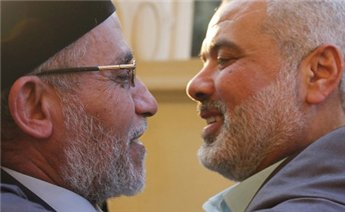UPDATES
Muslim Brotherhood leader: Liberating Jerusalem and Palestine should be “sole goal”
July 4, 2012 | Allon Lee

A June 14 speech by the Egyptian Muslim Brotherhood’s leader Mohammed Badie in which he dreams of a Muslim leadership ready to make the liberation of Palestine and Jerusalem “the sole goal” does not engender hope the world’s leading Sunni Islamist organisation is ready to moderate its extremist positions now that its candidate has won the country’s presidency.
In the speech, Brotherhood General Guide Badie, who selected Mohammed Mursi to run for the Egyptian presidency, says:
How happy would be the Muslims if all Muslim rulers made the Palestinian cause a pivotal issue, around which Muslims, rulers and the ruled, would line up [and ally to make] the sole goal for all of them the recovery of al Aqsa Mosque, freeing it from the filth of the Zionists, and imposing Muslim rule throughout beloved Palestine.
Badie outlines a future in which “solving” the Israeli-Palestinian conflict is not through negotiation but through further conflict:
We say to our people and our brothers in Palestine (all of Palestine): Unity, unity, persistence, persistence, reconciliation, reconciliation, and patience, patience. Make your motto and your starting point be in confronting the Zionists.
Furthermore, he posits the struggle to wrest the Old City of Jerusalem in purely religious terms, as jihad, which must subordinate all other concerns:
Every Muslim will be asked about the Zionists’ usurpation of al-Aqsa Mosque. Why did he not seek to recover it, and wage Jihad in His way? Did he not care about the fatwa of the ulema [scholars] of the Muslims, ‘Jihad of self and money to recover al Aqsa is a duty on every Muslim?’
The propensity for Middle East leaders to exaggerate and catastrophise is legendary and Badie stands out as being first among equals. Only two months ago on May 17 Badie described Israel’s creation as “the worst catastrophe ever to befall the people of the world”.
In contrast, much was made of President Mursi’s commitment to respect Egypt’s international treaties as an allusion to the Camp David Peace Accords signed with Israel in 1979.
But Mursi’s poker face is not particularly believable either. On June 29, he pledged to strive for the release of the Egyptian “Blind Sheik” – Omar Abdel-Rahman – who was imprisoned in the US over the bombing of the World Trade Centre in New York in 1993.
Unfortunately those suggesting America seek to pressure Mursi and co by threatening to withhold the US$1.3 billion in aid it gives Egypt each year ignore the obvious.
The Brotherhood is still competing with the military for power and will try to sound moderate and reasonable. But for Badie, the leader of what is an authoritarian party, war with Israel is a religious obligation. Expect that belief to be acted on sooner or later.
Analyst Walter Russell Mead argues that President Mursi himself may be tempted to use the anti-Israel card as a “weapon…to needle the army and apply some serious pressure”.
Looking at the history of modern Egypt, Mead notes:
“Not only is Sadat’s peace treaty widely unpopular in Egypt, but anti-Zionism also unites the passions of both nationalism and Islam, the two most powerful forces in the country’s psychology…. Under Nasser, the Egyptian military republic combined nationalism with passionate anti-Zionism as, among other things, a way to reduce the support for radical Islam. After Sadat’s treaty, anti-Zionism became one of the main Islamist talking points in the country. That remains the case today.”
Allon Lee
Tags: Egypt





